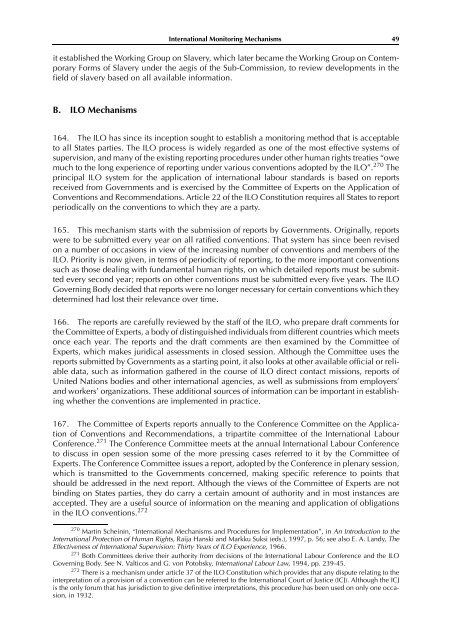Slavery in The 21st Century
Slavery in The 21st Century
Slavery in The 21st Century
Create successful ePaper yourself
Turn your PDF publications into a flip-book with our unique Google optimized e-Paper software.
International Monitor<strong>in</strong>g Mechanisms 49<br />
it established the Work<strong>in</strong>g Group on <strong>Slavery</strong>, which later became the Work<strong>in</strong>g Group on Contemporary<br />
Forms of <strong>Slavery</strong> under the aegis of the Sub-Commission, to review developments <strong>in</strong> the<br />
field of slavery based on all available <strong>in</strong>formation.<br />
B. ILO Mechanisms<br />
164. <strong>The</strong> ILO has s<strong>in</strong>ce its <strong>in</strong>ception sought to establish a monitor<strong>in</strong>g method that is acceptable<br />
to all States parties. <strong>The</strong> ILO process is widely regarded as one of the most effective systems of<br />
supervision, and many of the exist<strong>in</strong>g report<strong>in</strong>g procedures under other human rights treaties “owe<br />
much to the long experience of report<strong>in</strong>g under various conventions adopted by the ILO”. 270 <strong>The</strong><br />
pr<strong>in</strong>cipal ILO system for the application of <strong>in</strong>ternational labour standards is based on reports<br />
received from Governments and is exercised by the Committee of Experts on the Application of<br />
Conventions and Recommendations. Article 22 of the ILO Constitution requires all States to report<br />
periodically on the conventions to which they are a party.<br />
165. This mechanism starts with the submission of reports by Governments. Orig<strong>in</strong>ally, reports<br />
were to be submitted every year on all ratified conventions. That system has s<strong>in</strong>ce been revised<br />
on a number of occasions <strong>in</strong> view of the <strong>in</strong>creas<strong>in</strong>g number of conventions and members of the<br />
ILO. Priority is now given, <strong>in</strong> terms of periodicity of report<strong>in</strong>g, to the more important conventions<br />
such as those deal<strong>in</strong>g with fundamental human rights, on which detailed reports must be submitted<br />
every second year; reports on other conventions must be submitted every five years. <strong>The</strong> ILO<br />
Govern<strong>in</strong>g Body decided that reports were no longer necessary for certa<strong>in</strong> conventions which they<br />
determ<strong>in</strong>ed had lost their relevance over time.<br />
166. <strong>The</strong> reports are carefully reviewed by the staff of the ILO, who prepare draft comments for<br />
the Committee of Experts, a body of dist<strong>in</strong>guished <strong>in</strong>dividuals from different countries which meets<br />
once each year. <strong>The</strong> reports and the draft comments are then exam<strong>in</strong>ed by the Committee of<br />
Experts, which makes juridical assessments <strong>in</strong> closed session. Although the Committee uses the<br />
reports submitted by Governments as a start<strong>in</strong>g po<strong>in</strong>t, it also looks at other available official or reliable<br />
data, such as <strong>in</strong>formation gathered <strong>in</strong> the course of ILO direct contact missions, reports of<br />
United Nations bodies and other <strong>in</strong>ternational agencies, as well as submissions from employers’<br />
and workers’ organizations. <strong>The</strong>se additional sources of <strong>in</strong>formation can be important <strong>in</strong> establish<strong>in</strong>g<br />
whether the conventions are implemented <strong>in</strong> practice.<br />
167. <strong>The</strong> Committee of Experts reports annually to the Conference Committee on the Application<br />
of Conventions and Recommendations, a tripartite committee of the International Labour<br />
Conference. 271 <strong>The</strong> Conference Committee meets at the annual International Labour Conference<br />
to discuss <strong>in</strong> open session some of the more press<strong>in</strong>g cases referred to it by the Committee of<br />
Experts. <strong>The</strong> Conference Committee issues a report, adopted by the Conference <strong>in</strong> plenary session,<br />
which is transmitted to the Governments concerned, mak<strong>in</strong>g specific reference to po<strong>in</strong>ts that<br />
should be addressed <strong>in</strong> the next report. Although the views of the Committee of Experts are not<br />
b<strong>in</strong>d<strong>in</strong>g on States parties, they do carry a certa<strong>in</strong> amount of authority and <strong>in</strong> most <strong>in</strong>stances are<br />
accepted. <strong>The</strong>y are a useful source of <strong>in</strong>formation on the mean<strong>in</strong>g and application of obligations<br />
<strong>in</strong> the ILO conventions. 272<br />
270 Mart<strong>in</strong> Sche<strong>in</strong><strong>in</strong>, “International Mechanisms and Procedures for Implementation”, <strong>in</strong> An Introduction to the<br />
International Protection of Human Rights, Raija Hanski and Markku Suksi (eds.), 1997, p. 56; see also E. A. Landy, <strong>The</strong><br />
Effectiveness of International Supervision: Thirty Years of ILO Experience, 1966.<br />
271 Both Committees derive their authority from decisions of the International Labour Conference and the ILO<br />
Govern<strong>in</strong>g Body. See N. Valticos and G. von Potobsky, International Labour Law, 1994, pp. 239-45.<br />
272<br />
<strong>The</strong>re is a mechanism under article 37 of the ILO Constitution which provides that any dispute relat<strong>in</strong>g to the<br />
<strong>in</strong>terpretation of a provision of a convention can be referred to the International Court of Justice (ICJ). Although the ICJ<br />
is the only forum that has jurisdiction to give def<strong>in</strong>itive <strong>in</strong>terpretations, this procedure has been used on only one occasion,<br />
<strong>in</strong> 1932.

















